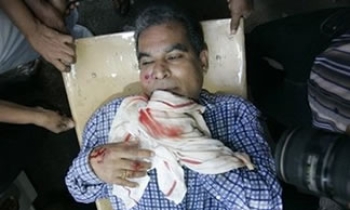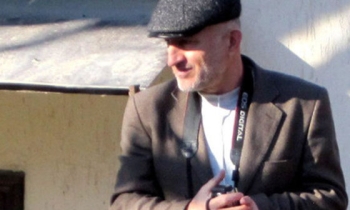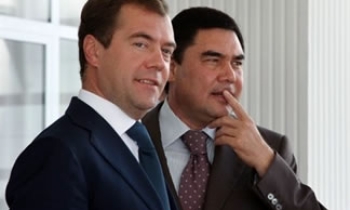Two Moroccan journalists who published a secret government document about terrorist threats against Morocco have been handed down prison sentences.
Abderrahim Ariri, publisher of the Moroccan weekly Al-Watan Al An, and Mustafa Hormatallah, a journalist for the paper, were convicted Wednesday by a criminal court in Casablanca of “concealing items derived from a crime” under article 571 of the Moroccan Penal Code, Ariri told the New York-based Committee to Protect Journalists (CPJ). He said the court sentenced Hormatallah to eight months in jail, while Ariri received a six-month suspended sentence. Ariri told CPJ that they were each fined 1,000 dirhams (US$120). He said they plan to appeal the decision.

“These politicised convictions are the latest in a series of official actions targeting independent journalists, and they reflect a steady erosion of press freedoms in Morocco,” CPJ Executive Director Joel Simon said. “Jailing journalists for publishing information that is clearly within the public interest violates basic norms for freedom of expression and belies Morocco’s declared support for a free and open press. We hope that the appeals court reverses this unjust verdict and that our colleague Hormatallah is freed.”
“This is a day of shame for the Moroccan government” said International Federation of Journalists (IFJ) President Jim Boumelha. “There is no doubt that this is a politically-motivated judgement designed to intimidate journalists and warn them of the cost of reporting government state secrets.”
“This sentence displays contempt for international legal practice, which has repeatedly reaffirmed the position that journalists should not be imprisoned for press offences,” Reporters sans Drontières (RSF) said. “We condemn the growing gulf between the government’s promises of democratisation and what it does in practice. This is the first time since October 2004 that a journalist has been sentenced to spend time in prison in Morocco, which now joins the club of North African countries - Egypt, Libya - that are holding journalists.”
The case against Ariri and Hormatallah stems from a July 14 article in Al-Watan Al An about secret government documents that reveal terrorist threats against Morocco. The weekly reproduced one of the purported secret documents of the General Directorate for Territorial Surveillance, a Moroccan security agency, which discussed the monitoring of jihadist websites.

Ariri and Hormatallah were summoned for questioning by police in Casablanca on July 17 and detained pending investigation for allegedly revealing national defense secrets. Ariri was released on July 24, but Hormatallah has remained behind bars and is now officially serving his eight-month sentence.
Ariri told CPJ that the Moroccan authorities “wanted to humiliate us by choosing this kind of accusation usually brought against those who steal cattle and animals. So they used the penal code against us, instead of the press law. We did not hide the documents they accused us of hiding; we did not conceal them. We published them.”
Ariri said the trial and sentence given to them was the result of the military becoming fed up with a newspaper that specialises in military and security issues. “It’s not a trial because of the publication of documents, it is the trial of the editorial line of our paper,” he said. “This trial is a message to all Moroccan journalists: The army is warning every Moroccan journalist to beware of getting close to the barracks.”
The IFJ affiliate, the Syndicat national de la presse marocaine (SNPM), took strike action on the day the trial opened calling it “a travesty of justice” and pressing for the charges to be dismissed and the journalists freed. “Our call fell on deaf ears” said IFJ Vice-President and General Secretary of the SNPM Younes M’jahed, “the judiciary is being used once again to gag journalists.”
“There are no grounds at all for imprisoning Hormatallah. While we do not underestimate the gravity of the case, in which eight officers have been convicted, we find it particularly unacceptable that a journalist should be jailed as a result of a judicial procedure lacking in transparency,” RSF said.
Al-Watan Al An frequently publishes stories critical of the Moroccan authorities. In March, it ran a story that criticized the king and palace officials for failing to cooperate with the Moroccan press.

Press freedom has deteriorated sharply in Morocco in recent weeks. On August 4, Moroccan police seized copies of the Arabic-language weekly Nichane from newsstands and other locations around the country and confiscated printed copies of its sister weekly, the French-language TelQuel at their printing press. The seizures came after Nichane published an editorial that questioned the use of legislative elections slated for September 7, as long as King Mohammed VI firmly controls all powers.
Ahmed Benchemsi, publisher of both weeklies, was formally charged on August 6 with failing to show “due respect to the king” under Article 41 of the Moroccan Press and Publication Law and could face between three and five years in prison and a fine of up to 100,000 dirhams (US$11,000) if convicted.
“By putting these journalists on trial and sentencing them to prison, the Moroccan government puts itself in the dock for its violation of press rights and it will be judged accordingly by the world community of journalists” said Boumelha. “This verdict delivers a hammer blow to Morocco’s reputation. It is sheer hypocrisy for government representatives such as Communications Minister Nabil Benabdellah to continue boasting about advances in democracy and freedom for Moroccan journalism when his country’s courts are throwing journalists into prison for doing their jobs.”
RSF said, “The initial case was split into two - a military one tried behind closed doors and a civilian one leading to Hormatallah’s conviction. This makes him out to be criminal, especially he was tried under criminal law, and not the press law. A journalist should not be punished for doing his duty to report the news and for ignoring requirements that only concern state officials.”
Wednesday's verdict against Ariri and Hormatallah comes one week after the US government-backed Millennium Challenge Corporation (MCC) approved a five-year $697.5 million economic aid package to Morocco—the largest such MCC grant since it was formed in January 2004.

MCC is a self-described US government corporation “based on the principle that aid is most effective when it reinforces good governance, economic freedom, and investments in people that promote economic growth and elimination of extreme poverty.” Millennium Challenge grants provide development assistance to allied nations but are contingent on a number of factors, including press freedom.
“We’re concerned that MCC’s board of directors did not take a careful look at Morocco’s worsening press freedom record in deciding to award this grant,” Simon said.
In a special report released earlier this month, CPJ noted that press freedoms in Morocco have notably regressed in recent years. Independent journalists have been the targets of a series of politicised court cases, financial pressures, and harassment from authorities.









